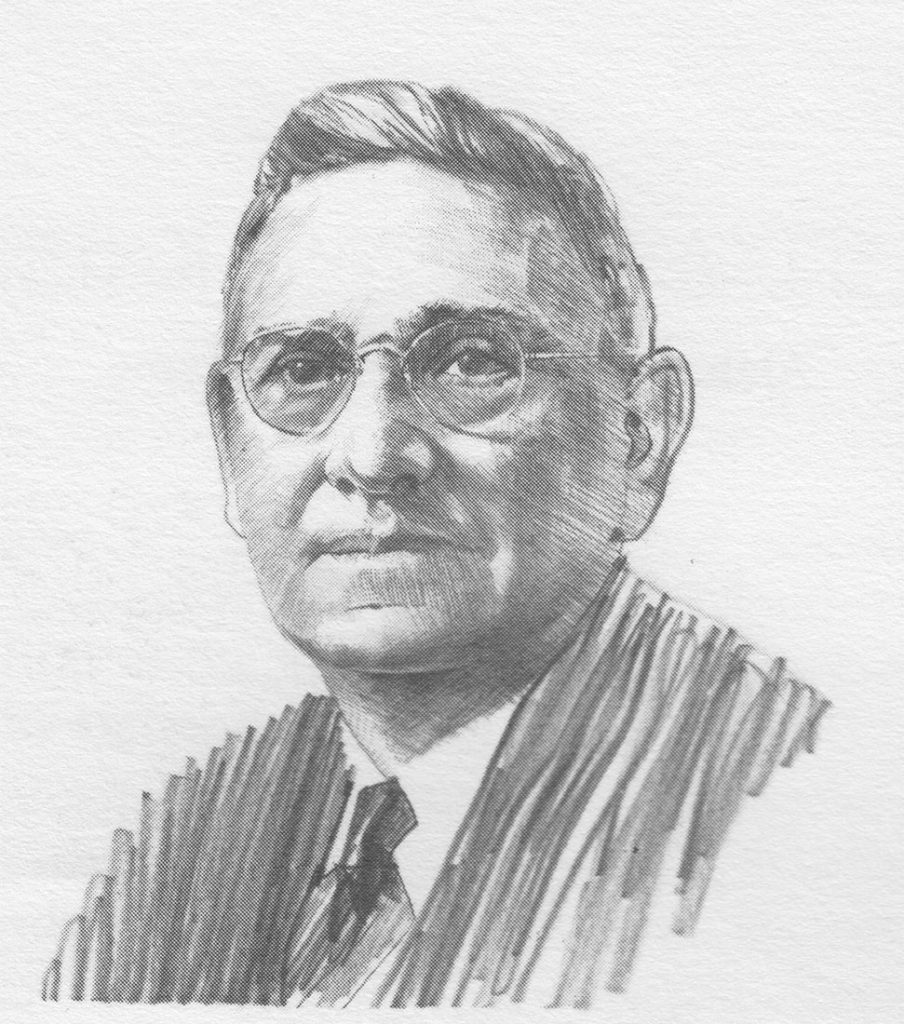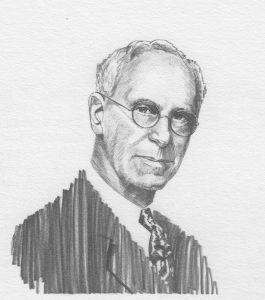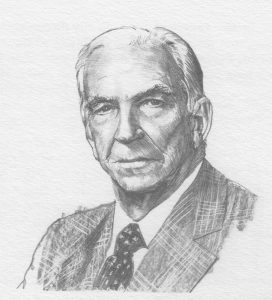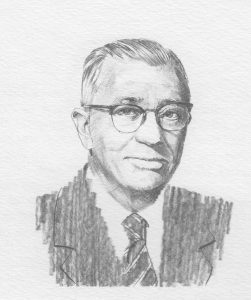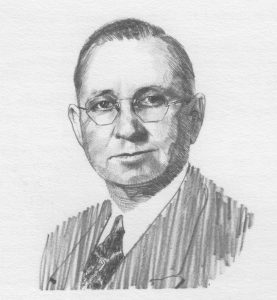Charles Anglin Hamilton was born in Anniston, Alabama, on January 28, 1876, a son of James Newton and Mary Elizabeth Hamilton, pioneer settlers in Northeast Alabama.
The elder Hamilton was a carpenter. The story is told that Charles was the first child born within the city limits after Anniston’s incorporation. Certainly, the cast iron pipe industry that developed in Anniston is the history of Charles Hamilton as well.
Anniston, the Model City, was incorporated in 1872 as a private town belonging to the Woodstock Iron Company. Its early economy was, of course, based on the iron industry and manufacturing processes related to iron. Young Hamilton, or Tobe as he was nicknamed, began work at the age of eight as a water boy at Hunter’s Ore Bank in the western section of town. He literally learned the iron trade from the ground up.
By the time that Hamilton had advanced to proficiency in the art of pipe molding, he decided to start a family. In April 1897, he married Margery Embry of Calhoun County. They later became the parents of four children. Two children, Frank and Charles, learned the pipe business and followed in their father’s footsteps while another son Ralph held other financial interests in Anniston. Julia, Tobe’s daughter, married an Anniston businessman.
Hamilton’s career reads like that of a hero of a Horatio Alger novel. Hamilton never attended high school, working instead to support himself and his widowed mother. As an adult, he attended night school, but from a tender age, his education was the practical experience he could obtain for himself. His performance of early, menial chores won him the admiration of coworkers and employers, and he advanced successively to more demanding jobs. After his days as a water boy, the Anniston Pipe Company hired him to make hay rope and sift sand, both processes used in pipe molding. Hamilton remained with the company for ten years until it closed in the midst of economic depression. The Hercules Pipe Company next hired him, and he spent two years learning the art of molding and pipe ramming. The coming of the Hercules Company to Anniston did much to restore business confidence shaken by the depression years of the 1890s.
When the Hercules Company closed, Central Foundry hired him as a molder and he remained there for four years. In 1905 Anniston Foundry Company employed him as a superintendent, a position he held until 1912. During these years he was learning all aspects of pipe manufacturing and saving money to enter business on his own. In 1912, Hamilton, Major W. F. Johnston, and Thomas E. Kilby, later Governor of Alabama, purchased an inactive plant facility and formed the Alabama Pipe and Foundry Company. Hamilton was President and General Manager. Kilby served as Chairman of the Board. Soon Hamilton and his partners began purchasing other properties. In 1915 they acquired Standard Foundry and Ornamental Foundry. Five years later they purchased Lynchburg Pressure Pipe Company and thereby became the first manufacturers in Anniston of both soil and pressure pipe.
Hamilton had a policy of investing profits back into his business and his city. He believed that Anniston and its citizens could benefit from his own success, which he credited to the fact that he had faith in Anniston and remained in his hometown. “I attribute my success to the fact that I have purposely remained in Anniston,” remarked Hamilton. Once, before achieving his dream of owning a foundry, he had been offered a job in another city at double his current salary. He refused, preferring to seek his fortune in Anniston.
Hamilton also became actively involved in all phases of community life. In 1914 he was elected to the Anniston City Council. During this period there was considerable lawlessness in Anniston. Several police officers had been killed. As chairman of the Police Committee, Hamilton helped restore law and order and at the same time increased the efficiency of the Police Department. By 1920 the job was done, and Tobe Hamilton’s political ambitions were satisfied.
By 1924 Hamilton had reorganized the Alabama Pipe and Foundry Company, consolidating new acquisitions and older properties into the Alabama Pipe Company. This corporation, manufacturers of cast iron soil and pressure pipe, was the largest of its kind in the world. It consisted of twelve plants in Alabama and Tennessee and sales offices and warehouses in Chicago and New York. Later the company also acquired a plant in Kansas City, Missouri. Alabama Pipe manufactured cast iron water, gas, and sanitary pipes and fittings. The firm sold its products throughout the United States, as well as in Mexico and South and Central America.
Tobe Hamilton continued his civic work as he built his business. In 1928 he was elected President of the Anniston Chamber of Commerce and was the only individual to serve in that elected office for two consecutive terms. In 1917 the Chamber of Commerce had purchased land and presented it to the War Department as the site for Fort McClellan. As a result, the Chamber had incurred a heavy debt. Hamilton, in one of his first acts as President, created a five-year plan to amortize the debt. Another Hamilton achievement was the creation of the Inter-Club Council which was the predecessor of the Community Chest.
Hamilton was also active in church work. He was a member of the First Methodist Church where he served as a steward. For many years he was chairman of the finance committee. He was a member of the Country Club, of which he served as president, and was a member of the Rotary Club, among other organizations.
As Hamilton became financially able, he turned his profits into investments in Anniston. He invested in downtown Anniston business properties and was a stockholder in the Anniston Land Company. He also served as president or director of numerous Anniston companies: Anniston Ice and Coal Company, Polar Ice and Coal Company, City Bank and Trust Company, and Commercial National Bank. He was a director and principal stockholder of the Anniston
National Bank and the First National Bank of that city. His investments in the Anniston business community showed his deep faith in and commitment to his native city.
Hamilton was also involved in other enterprises in the state. He was a larger stockholder or director in Birmingham Smelting and Refining Company, Birmingham Fire Insurance Company, Alabama Ice Company, and the Allstate Life Insurance Company of Montgomery. Other businesses sought his business acumen.
Late in life, Hamilton suffered from heart ailments and on June 12, 1942, he died after a lengthy illness. The citizens of Anniston lost a civic-minded man committed to making his community an attractive and prosperous place.

